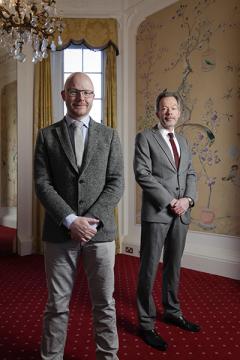Taking the Edinburgh experience to China
Edinburgh has formed an innovative degree partnership with Zhejiang University.

A unique biomedical partnership with Zhejiang University in China has created a Scottish university first. Health provision is one of China’s strongest growth areas – one in which Edinburgh is playing a leading role. In 2015, the University announced an innovative degree partnership with Zhejiang University in the subject of integrative biomedical sciences.
Co-devised by academics from Edinburgh and Zhejiang, to reflect the range of expertise in biomedical sciences at both universities, the four-year undergraduate programme is expected to attract some 600 students over the next five years. Taught entirely in English by Edinburgh and Zhejiang academics in Haining, the plan is to attract the brightest students from China – and elsewhere.
The University’s Professor Jeremy Bradshaw, Assistant Principal Researcher Development, has been instrumental in bringing the project to fruition. Having surveyed education in China for the UK Quality Assurance Agency in 2013, he was particularly impressed by a model of joint provision that involved Zhejiang.
He believes the significance of the agreement should not be underestimated: “The biomedical science degree partnership with Zhejiang University not only provides opportunities for Chinese students to gain an ‘Edinburgh experience’ in their own country, without the expense of relocating to Edinburgh, it also enables the two universities to learn from each other at all levels, and develop truly significant joint research, in a long-term partnership that will outlast the typical life span of international research collaborations.”
Truly collaborative
Edinburgh’s Professor John Stewart is leading Edinburgh’s involvement in the project and highlights the fact that every aspect of the course has been developed in a collaborative way. He says: “The University of Edinburgh is not just taking courses that are delivered in Edinburgh to China and delivering them there. Rather, we are developing this new programme to suit the needs, requirements and aspiration of the students in Zhejiang.
“As well as staff based permanently there, we will utilise so-called ‘flying faculty’ – who will spend shorter periods on campus and provide their particular expertise to students. Additionally, we will make use of Edinburgh’s enviable online learning capability, which successfully delivers tuition at a distance.”
The new degree programme will offer a curriculum reflecting the full breadth of biomedical science, including infectious diseases, neuroscience, pharmacology, physiology and reproductive biology. In a country where the discipline of biomedical sciences is new, Professor Bradshaw believes Edinburgh offers something valuable for the future. “As medical research develops in China, it will become increasingly important to have suitable undergraduate programmes to provide the research-competent graduates that the growth will require,” he explains.
As well as staff based permanently in Zhejiang, we will utilise ‘flying faculty’ who will spend shorter periods on campus and provide their particular expertise to students.
While this degree is new, the tradition of Edinburgh’s medical expertise being put to good use in China is not. In 1881 David Duncan Main, an Edinburgh medical graduate, arrived in China and started work in the 1,300-bed hospital at Hangzhou College. By the time he left China 45 years later, he had established at least 30 medical and welfare institutions, as well as providing medical training to hundreds of Chinese men and women, and translating a number of English-language medical texts into Chinese.
For Professor James Smith, Edinburgh’s Vice-Principal International, the Zhejiang partnership follows in the best traditions of Edinburgh’s ability to connect with people around the world.
“Working with international partners is absolutely critical,” he states. “It extends the reach, quality and impact of both our teaching and research and allows us to scale up our activities and undertake fresh initiatives that we simply cannot complete by ourselves. Developing high-value partnerships lies at the heart of our global engagement, and the Zhejiang project points the way as to how that can be achieved.”
Differences an advantage
The Zhejiang partnership is not without its challenges, concedes Professor Stewart, but he believes all obstacles will be overcome. “The recruitment processes, degree award and classification and many other matters are different between China and Scotland, as are the general cultural and educational systems. However, I see the fact that we come to the table with very different experiences as a great advantage, and there is tremendous enthusiasm on both sides to make this a success.”
China is a country with which Edinburgh’s engagement levels are rising, and 2015 saw several other developments for the University. One of the most significant was the establishment of a new office by the University’s Edinburgh Centre for Carbon Innovation (ECCI) in Hong Kong.
Scotland’s First Minister, Nicola Sturgeon, officially opened the Centre at the Hong Kong Science and Technology Park as part of a Scottish Government trade mission. The new Centre will enable low-carbon experts to develop solutions to some of the biggest challenges facing mankind, including air quality, energy efficiency and sustainable construction.
Meanwhile, work is already under way to develop other programmes with Zhejiang. The agreement with the Chinese Ministry of Education provides for a second undergraduate programme to be delivered jointly, while discussions are also taking place to establish joint MSc and PhD programmes in the near future.

